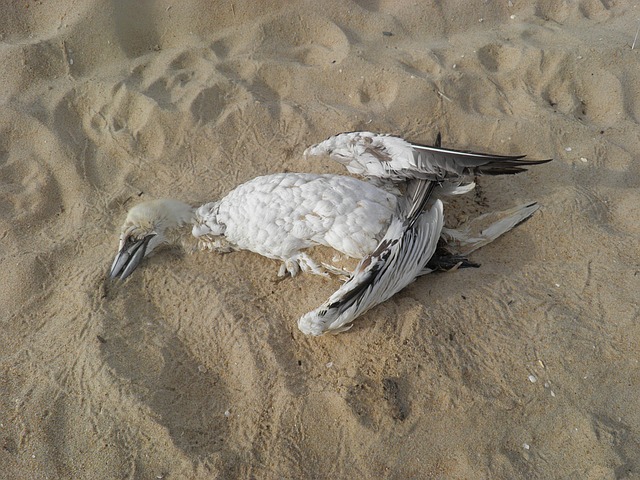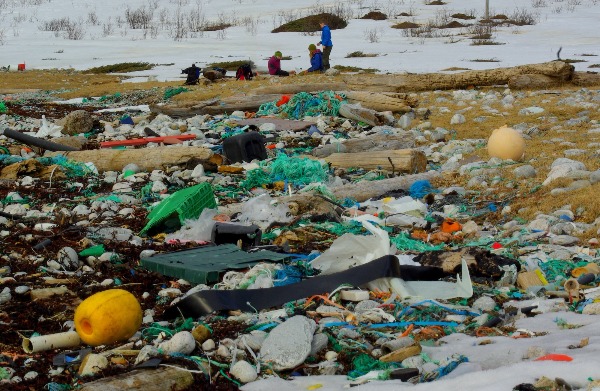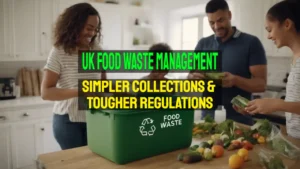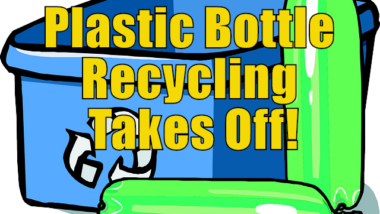Ocean litter is a massive problem, with plastic items being the largest offenders. In this article we look at the plastic trash menace and the paradox of plastic use, and support a proposal by one member of the UK's waste management community (CIWM), that single use plastic containers must be curtailed or stopped, in our video.
First of all we look at some recent articles which have served to raise public awareness of the problem. And, finally we include information about a recent article in the CIWM Journal that provides the controversial proposal that use of plastic for the production of non-returnable bottles be drastically curtailed.
We appreciate that these articles may be quite time-consuming to read, so we have produced a video on the subject of the CIWM article which we recommend that you view below. It contains an introduction to the ideas in the CWIM article, and is provided below:
In a way this video could be called How to Reduce Ocean Litter, and this is important because:
The Great Pacific Garbage Patch is a mess of trash and plastic that moves around the north Pacific Ocean and is roughly the size of Texas. It has a high concentration of plastics and chemical sludge. Photos from the patch of trapped sea turtles and tires … via New ocean garbage patch discovered
A Personal Insight Into the Marine Litter Problem
My love of the water found me through a love of water sports. As an undergrad at Cornell, I explored marine ecosystems as a certified windsurfing and catamaran sailing instructor. My curiosity for what lay below to surface led me to a National Geographic … via I’ve Spent My Life Studying Ocean Trash. Here’s What I Wish More People Knew
No Matter How Many People Volunteer for Beach Clean-ups It Isn't Enough!
Each year millions of people living near the ocean flock to local beaches to take part in international cleanups to help fight ocean plastic pollution. Often, they do so through organizations focused not only on cleaning up the trash but also on … via Citizen Scientists Create Big Data on Ocean Trash From Beach Cleanups
FIVE Steps to Cut Waste Plastics Entering the Oceans by Two-Thirds

The introduction of a deposit return scheme for plastic bottles is among the measures which could cut marine pollution in the UK by two-thirds, according to independent charity, the Green Alliance.
The largest proportion (33%) of plastic litter comes from plastic bottles (see infographic 1), and this problem is likely to escalate as global bottle production is forecast to jump by 20%.
Green Alliance analysis shows that the single most effective action would be to stop plastic bottles getting into the sea through a deposit return scheme .
The introduction of a deposit return scheme for plastic bottles is among the measures which could cut marine pollution in the UK by two thirds, according to independent charity, the Green Alliance.
The organisation noted that while the steps taken so far, including the 5p charge on single use plastic bags, have reduced marine debris by around 2%, much more still needs to be done. The plastic bag charge was said to address 1% of the plastic that enters the sea.
Plastic pollution has serious implications for the fishing and tourism industries, and to human health. Keeping it from getting into the ocean is the most effective means of protecting the sea and people.
In a speech to WWF in July, Environment Secretary Michael Gove promised to tackle marine plastic litter as part of a renewed waste and resources strategy.
Green Alliance said that while Gove’s announcement that microbeads will be banned from rinse-off products later this year is a step forward, it will tackle less than 1% of the problem. via Keeping it from getting into the ocean is the most effective means of protecting the sea and people. In a speech to WWF in July, Environment Secretary Michael Gove promised to tackle marine plastic litter as part of a renewed waste and resources strategy. via FIVE Steps to Cut Waste Plastics Entering the Oceans by Two-Thirds
Millions of metric tons of marine trash pollute the oceans and coastlines each year, which greatly puts marine life in danger and destroys the balance of the oceanic ecosystem. In order to take action, two surfers founded the 4Ocean organization which aims … via Each of These Recycled Bracelets Helps Remove 1 Pound of Marine Trash
They encountered the garbage patch in a remote pocket of the Pacific Ocean. The floating garbage heap is made up of tremendous quantities of plastic, chemical sludge, and human trash. In a report by Tom Hale of IFLScience, Moore said that the garbage heap … via There’s a Garbage Patch as Big as Mexico Floating in the Pacific Ocean!
At the end of fledging season, the island is dotted with plastic-filled boluses and chick corpses crammed with trash. But birds aren’t the only source of manmade junk on the island. Midway lies along a giant ocean current that transports floating trash … via On a remote island, baby albatrosses suffer from a diet of plastic trash

The problem with plastic waste in the oceans is for many best known through the great pacific garbage patch, a floating island of plastic waste created currents grouping trash together in one area was what initially sparked my concern when it was first … via How big is the problem of plastics in the ocean and what are we doing to solve it?
The numbers are staggering: There are 5.25 trillion pieces of plastic debris in the ocean. Of that mass, 269,000 tons float on the surface, while some four billion plastic microfibers per square kilometer litter the deep sea. Scientists call these … via Ocean Trash: 5.25 Trillion Pieces and Counting, but Big Questions Remain
A vast amount of the plastic garbage littering the surface of the ocean may be disappearing, a new study suggests. Exactly what is happening to this ocean debris is a mystery, though the researchers hypothesize that the trash could be breaking down into … via What's happening to plastic trash littering the ocean?
It restores me, and it reminds me that the work Ocean Conservancy is doing to protect it is so important. As the 4th of July holiday weekend approaches, I know this beach will become more crowded — with people, and sadly, with trash. Ocean trash is the … via Ocean Trash Is No Picnic
Before there was a waste collection system in place on land, trash was left in the streets and disease was rampant. Similarly, the trash we are dumping into the ocean is having catastrophic effects on the animals that call the ocean home and the people who … via The Impact of Ocean Trash
UNEP launched a global campaign last month aimed at eliminating two of the chief sources of ocean trash by 2022: microplastics frequently used in cosmetics and single-use plastic products like shopping bags. Ten different countries had already joined the … via UN launches campaign to take out ocean trash
It is undeniably an ambitious vision. Boyan Slat, a charismatic 22-year-old drop-out inventor, plans to clean up plastic trash circulating in the North Pacific Gyre by launching a fleet of floating trash collectors. Ocean currents would propel floating … via Critics say plan for drifting ocean trash collectors is unmoored
MIAMI A tidal wave of man-made trash is threatening world oceans, damaging wildlife, tourism and seafood industries and piling additional stress on seas already hit by climate change, conservationists said on Tuesday. A report by U.S.-based Ocean … via Tidal wave of trash threatens world oceans
Those of us who are fortunate to live in the Keys have a special relationship with the ocean. For many, its health has a direct bearing on livelihood. For others, it provides recreation, opportunities to observe its amazing bounty of life, or quiet moments … via The ocean suffers from thoughtless littering
If any of our readers did not previously appreciate what a big problem plastic trash building up in the world's oceans truly is then this article will, we hope, raise your awareness, and maybe even convince you to support action to reduce ocean litter.
Marine Litter – The Plastics Paradox?
What do we do about it?
Clearly, we need to make better progress in designing out single-use plastic items and, where we can’t, we need to design for recyclability.
For example, do we need to buy another disposable bottle or could we carry one that we can refill?
Fundamentally, we need a far stronger effort to prevent plastics leaking from the system in the first place.
For example, Hubbub’s current For Fish’s Sake London campaign, is helping make consumers aware of the effects of littering.
For example, do we need to buy another disposable bottle or could we carry one that we can refill?
City to Sea its Refill Bristol campaign has created some real momentum.
via CIWM-journal-marine-litter-plastics-paradox
Whether this page has sparked the notion of taking action in your mind, or not, your comments on this subject are eagerly awaited.
Ramp Method of Waste Disposal – Landfill Guide & Techniques
The ramp method optimizes landfill operations by creating an inclined surface, allowing efficient waste compaction and daily cover application. Unlike traditional methods, it requires minimal excavation, reducing costs and extending landfill lifespan. Proper implementation and equipment maintenance are key to effective ramp method performance in various terrains…
The Future of UK Food Waste Management – Simpler Collections and Tougher Regulation
The future of UK food waste management will be a big push toward higher recycling rates through simpler collection and far greater consistency across the nations, helping citizens understand how to be green and recycle more organic waste. As the UK continues to advance its environmental goals, recently announced government policies aimed at simplifying waste […]
Cost of Commercial Waste Disposal UK: Keeping the Numbers Low: What UK Rubbish Really Costs
Managing rubbish costs money. UK companies know this too well, as they deal with heaps of trash every day. Every year, these businesses create 27.5 million tonnes of commercial waste and 13.6 million tonnes of industrial waste – that's a mountain weighing 41.1 million tonnes! Tossing all that waste can eat up to 4-5% of […]
Can You Take Plaster to the Tip? Guidelines and Restrictions for Disposing of Plaster and Plasterboard Waste
Plaster and plasterboard are common in building and fixing up homes. These materials can't just be thrown out like regular rubbish. Some recycling places take them, but you need to know the rules first. Plasterboard should not go to a landfill as it's against the law due to environmental concerns. Also, some dangers come with […]










Guys. All must press for action. By now, plastic bits are so pervasive they’ve spread to some of the furthest reaches of the globe. Just last month, scientists said ocean plastic has started washing up in the Arctic for the first time.
It’s on every beach, it’s found in sediment worldwide. “It’s a plastic smog throughout the world’s ocean.
No matter how many times we volunteer to clean the marine water it will not be enough unless everyone will stop using plastics and throwing them to bodies of water. Everyone should play a part in keeping our water clean and plastics must be used only when necessary.
Government must make new laws requiring all companies to use biodegradabile plastics for packaging. The solution of the problem can’t come from individuals people. It’s a national solutions that has to be done.
Nice thoughts, care to read this article if you like to save the ocean from garbage.